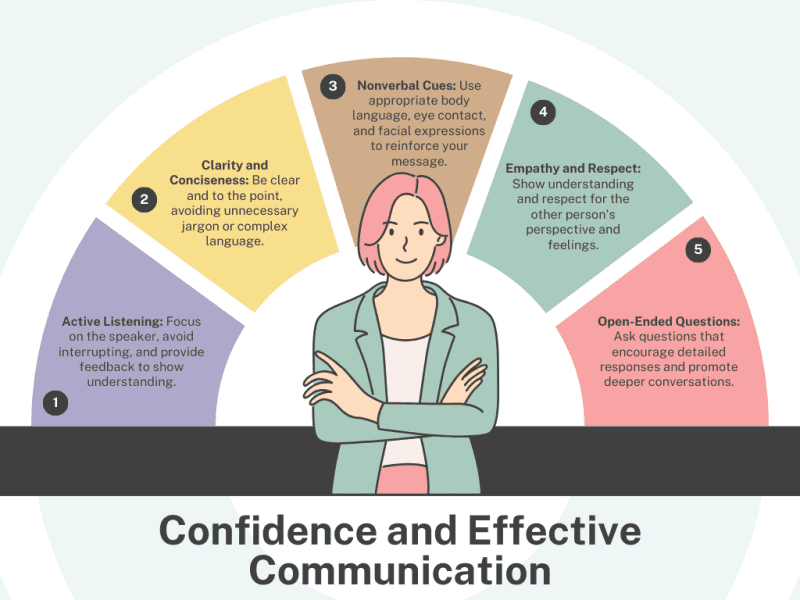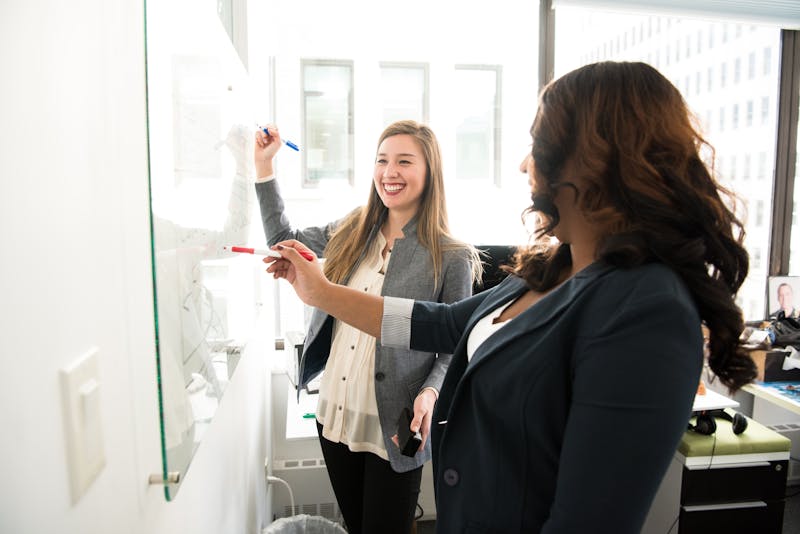10 Ways To Be More Confident At Work

Confidence is a ladder towards success in the workplace, as it is in life. Not only does this help to improve your specific performance but also allows you to grow in the company, maybe even take on a supervisory role. Confidence in the process of constructing as well as sustaining may often pose a significant problem but is critical in attaining professional objectives. This piece looks at practical tips on how to increase your confidence while at work so that you can handle the case of challenges assertively.
Know and Leverage Your Strengths
It is crucial not to overlook that everyone has their own strengths, special skills, and abilities. It is beneficial to recognize what you are good at and how you can use these skills to highly increase your confidence. Take some time to reflect on your knowledge and successes. Where are your strengths? What do colleagues and supervisors often say about your work or performance?
When you know your strengths, strive to apply them in the activities that you perform today. As a result, when you are working in your field of specialization, you always know that you are in charge and have adequate skills. Also, you can ask your colleagues or even attend a professional skills course to review and improve your work, and provide constructive feedback regarding your positive points and weaknesses.

Set Achievable Goals
In setting concomitant confidence, it is paramount to set realistic goals while aiming high. Break down large projects into smaller tasks with clear timelines for completion. When one sets such minor goals, there is a feeling of having accomplished something, which in turn builds up your confidence level.
Ensure your goals are SMART: To be specific, measurable, achievable, relevant, and time-bound. Monitor and modify goals frequently to ensure focus and motivation with regard to the goals set. It is important not to let any little achievements on the way go unnoticed and ignored, as they make the larger goals achievable and tangible.
Seek Continuous Learning
A person who gains more knowledge and skills tends to gain more self-esteem. In line with the characteristics of a creative professional, embrace an ethos of lifelong learning. Read industry-relevant articles, attend conferences, and take online courses to stay updated with developments in your field.
Professional development not only helps you acquire more skills but also shows interest regarding career success and progression. This proactive approach may help make you feel more ready and able to handle a role, which in turn may lead to confidence. It is acceptable to ask questions or advice from others, especially seniors because practice makes them experts in handling difficult tasks.
Dress for Success
Here are some ways that clothing can affect one’s self-esteem. It is important to dress appropriately for business to gain more confidence and be respected by everyone around you. The following reasons may contribute to the understanding of why appearance matters at work: The clothes you wear have an impact on your confidence, which can boost your performance and communication skills at work.
Be neat in your dress and appearance as it is expected that you appear professional and well-presented at all times. This does not necessarily mean the man must be wearing expensive clothes, but rather clean and well-ironed clothes that give the man the feeling of being strong and capable.
Build a Supportive Network
As stated above, having supportive colleagues and supervisors is inspiring and makes one feel more confident. Developing positive professional relationships can provide a valuable support system, especially during difficult situations. These relationships can provide moral support, motivation, and advice to the deserving recipient.
Professional development is not only beneficial to a professional but also proves that he or she is willing to go the extra mile. This proactive approach can make you feel ready and capable of taking on responsibilities, thereby enhancing your confidence. It is safe to request clarifications or advice from other staff members; this is another manner in which one can develop proficiency.
Attend conferences and exhibitions, become a member of relevant associations, and look for a role model. A strong reference group of people who support your capabilities enhances your confidence, as you feel you belong and are appreciated in your workplace.

Practice Self-Care
Staying healthy both physically and mentally is very crucial to boost confidence especially when going to work. Proper exercise, a healthy diet, and sleep all have a bearing on physical health, which in turn influences mental and emotional health.
Practicing relaxation and coping skills like meditation, deep breathing, or other techniques can help you stay calm. Spend some time doing things that you like and finding ways to relieve stress. If you are healthy both physically and mentally, you are likely to have a positive attitude toward your job assignments.
Embrace and Learn from Failure
Self-confidence can be hampered greatly by the fear of failure. Nevertheless, failure is good in the sense that it is a stepping stone towards success. One must consider failure as a way of gaining knowledge and not as a drawback or loss since it fosters strength and self-assurance.
When you fail, reflect on what happened and consider how you can avoid making the same mistake in the future. Treat these experiences as learning opportunities where you discover better ways of doing things. Knowing that it is okay to fail makes you approach risk and challenges with more confidence.
Practice Effective Communication
In confidence building, communication is a key area of consideration in organizations. The power to speak effectively and assertively means that one will be able to enunciate their ideas thus making them be given importance. Maintain good attention, in which one receives and interprets what others convey to them, provides sensible reactions, and recalls the conversations.
While communicating, one should avoid unnecessary lengthy discourses and come directly to the point. Quick tips include: speak with a confident tone, make eye contact, and have a firm handshake. Improve your interpersonal skills because being able to voice your opinion in a meeting, and stand in front of others to make a presentation greatly boosts your self-confidence.

Stay Organized and Prepared
Staying organized and being prepared for your workday can do wonders for your self-assurance on the job. It is also helpful to organize your tasks and time using to-do lists, calendars, or any project management software. Knowing what is expected of you reduces stress and guides your next steps.
These skills are very important in preparing for meetings, presentations, and projects. The more practiced you are, the more self-assured you will be. Periodically check your work to ensure it meets minimum quality standards and ask questions when necessary.
Give and Receive Feedback
Positive criticism is one of the most effective ways of self-empowerment. Always ask supervisors, colleagues, and mentors how you can be better and what you are doing right. Learn to accept criticisms and regard them as a form of feedback that can help you improve.
Responding to feedback means that you are ready and willing to grow and learn and demonstrate that you are willing to make changes. Regularly applying suggestions for improvement will lead to noticeable improvements, boosting your confidence. On the same note, offering feedback to others can also assist in enhancing confidence because you are also refreshing your ideas and knowledge.
Conclusion
Developing confidence at the workplace is an ongoing process of identifying strengths and using them, setting realistic goals and achieving them, concentrating on learning processes, and mastering skills of interaction. The strategies for improving your confidence include dressing properly for the job, surrounding yourself with positive people, taking care of yourself, handling failures, keeping things in order, and asking for feedback.
Confidence enhances performance and efficiency, paving the way for innovation and career progression. Integrating these ten strategies into your daily routine can help you build the confidence needed to succeed in your career. However, it’s important to note that confidence is a process, not a destination. Never stop trying to get better, and be sure to enjoy the process of growth as well!

FAQs
1. How can I determine what my strengths are and how will I be able to apply this in building my confidence at the workplace?
Have a complete self-assessment and review portfolios from previous projects, get feedback from peers and supervisors, and think about what activities are easiest and most enjoyable. Self-awareness in the selection of tasks and understanding one’s strengths may improve performance and confidence during work tasks.
2. How can self-care boost confidence in the workplace?
Exercise at least thirty minutes every other day, try to eat healthily, make sure you have enough rest, and if possible take time to meditate or practice some form of stress-relieving practice. These practices assist in keeping your body and mind fit and healthy and Seeing yourself in this positive way makes you feel more confident.
3. What are the actions that can be used to enhance confidence at the workplace using feedback?
Admit supervision from superiors and peers and seek suggestions on how they can improve; embrace criticism as more of a way to learn. Apply the feedback you receive to improve your skills and productivity. Recognizing the positive outcomes of constructive criticism will boost your confidence.

